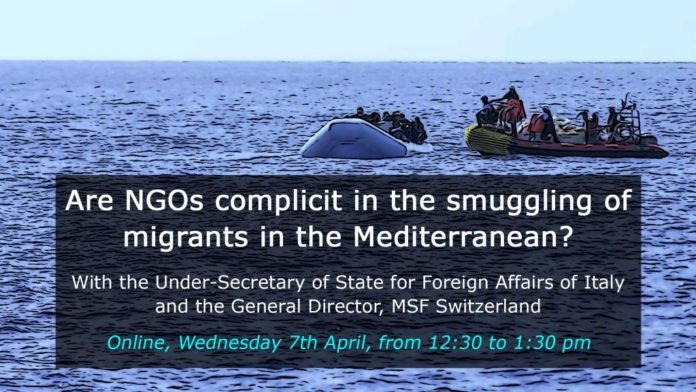GENEVA, APRIL 7 – In recent months, the pressure on NGOs trying to rescue refugees adrift in the Mediterranean has increased. Three NGOs (Médecins sans Frontières, Save the Children and Jugend Rettet) have been accused by the Italian justice of complicity with smugglers following a vast investigation involving a police officer who infiltrated a rescue ship. 21 activists, seafarers and NGO leaders have been summoned to court. The three NGOs had to give up their rescue operations. And others have done so before them. They are accused of playing into the hands of the smugglers with whom they would have put themselves in direct contact to recover their human cargo. In exchange for the possibility of saving lives at sea, these NGOs would have allowed the smugglers to regain possession of their boats and thus escape the coastguards. This so-called practice has led the former Italian Minister of the Interior of a the right party, Matteo Salvini, to say that the NGOs are the new “cabs of the sea” serving migrants. The case against the three NGOs is ongoing and could last for many more months, if not years, while refugees left to their own fate, fleeing the Libyan coast, continue to sink and die in the Mediterranean.
Are these accusations true? How do these ships operate off the Libyan coast? How does the new Italian government of Mario Draghi intend to follow up on these measures against NGOs? Do they want to prevent any NGO from going to sea to provide assistance? Under what conditions can they now operate? Can Europe continue to turn a blind eye to the sea route where thousands of refugees are dying? How can the European Union relieve Italy or Greece, in the front line, of the burden of the survivors?
These are some of the questions the Geneva Press Club will address with our panel of key players in this issue. The new Italian Under-Secretary of State for Foreign Affairs, Benedetto della Vedova, and the Director General of Médecins Sans Frontières Switzerland, Stephen Cornish, will be facing each other. They will be joined by Flavio Di Giacomo speaker for of the International Organization for Migration (IOM) in Italy and Seraina Eldada, former mediator on board the Aquarius, currently project manager at the Geneva Center for Security Policy (GCSP).

